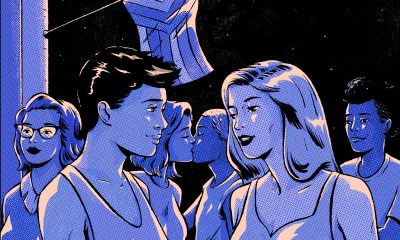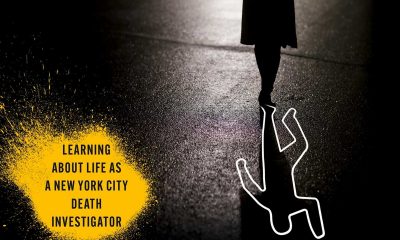Arts & Entertainment
Sharon Gless on new memoir and connection to LGBTQ community
Beloved TV icon’s book was seven years in the making
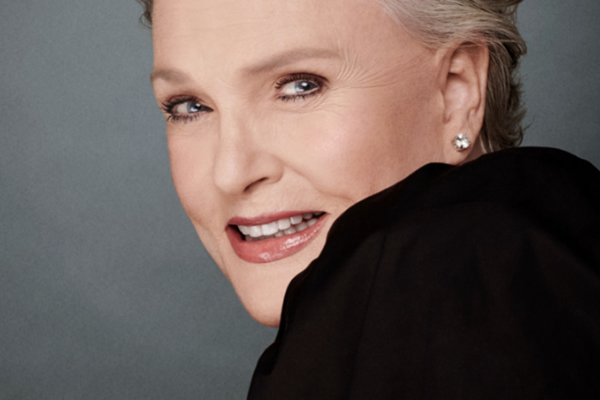
Have you ever read a memoir that is so intimate, so revealing, so honest, that as you were turning the pages it felt like the writer was sitting next to you, speaking directly to you?
Kudos to multiple Emmy Award-winning actress Sharon Gless for making that a part of the experience of reading her new memoir “Apparently There Were Complaints” (Simon & Schuster, 2021). The Los Angeles native with Hollywood in her veins (her maternal grandfather was a hotshot entertainment lawyer), Gless rose to prominence via her portrayal of New York police detective Christine Cagney in the popular and groundbreaking 1980s TV series “Cagney & Lacey”(alongside Tyne Daly). As if she hadn’t already established an LGBTQ following through that show, she went on to play Debbie Novotny, the smart and sassy mother of Michael on Showtime’s equally groundbreaking “Queer As Folk”in the early 2000s. Gless sat down for an interview in advance of the publication of her book.
BLADE: Your new memoir, “Apparently There Were Complaints” opens on a serious note with your 2015 pancreatitis diagnosis. So, I’d like to begin by saying that, from one Gemini to another, I hope you are in good health.
SHARON GLESS: Thank you, honey, I’m in very good health. Thank you, my fellow Gemini.
BLADE: Why was now the time to write your memoir?
GLESS: Well, it’s taken seven years. It’s not like it was yesterday. I never actually intended to write a memoir, Gregg. I was called in to a meeting by CBS for what I thought was a conversation to offer me a new series. We talked for an hour and, apparently, I was so entertaining that at the end of the hour meeting, the president of CBS said, “You know we own Simon & Schuster.” I said, “I didn’t know that.” She said, “We do, and I think you’ve got a book in you.” I said, “I don’t usually write.” She said, “That doesn’t matter. You’re a storyteller, Sharon.” So I walked out with a book deal [laughs] with Simon & Schuster and not the series I was hoping for. Actually, I didn’t meet (with) Simon & Schuster for another year. I sort of let it go. The next day there was a text from the president of Simon & Schuster. I sort of ignored it because I didn’t want to do that. I wanted to act! A year went by, and I wasn’t so busy, and I was in New York, and I said, “What the hell!” I went to meet him. I read one chapter to him, one chapter that I had written in case he asked for anything. He signed me that day [laughs].
BLADE: Were you a journal or diary keeper or did you rely on your memory for the details?
GLESS: Never. No. My very best friend Dawn (LaFreeda), who’s been my best friend forever and … I’m a talker, a storyteller, and I would tell her stories about my life throughout our relationship. She kept them! She said, “You have a book in you.” So, there’s another person saying so. She kept the stories. When Simon & Schuster made me the offer, Dawn dragged out all my stories. A couple of times I had gatherings at my house where I had four people over, and I said, “Ask me some questions,” and put a recorder down. I’d just start talking. Then as more of my life coming out on the page, which is hard to do, I started remembering more and more. It took a form that I had always intended. I came up with the title, “Apparently There Were Complaints,” very early on. I made the book about all the complaints people had about me throughout my life. It helped that Dawn had kept records of all the stories I’ve told. Some of those I used in the book. It’s funny, as you write, as you keep going, you start remembering more and more and more because one emotion leads to the next emotion or the next time someone hurts your feelings or the next complaint.
BLADE: I’m glad you mentioned the emotional part of it, because writing a memoir means revisiting the past, including your complicated relationship with your grandmother, whom you called Grimmy, as well as your parents. Did you find it to be painful, freeing or both?
GLESS: Sometimes because some of the memories were painful. There were times when I was reading some of it that I would go back to that place. I just finished recording [the audio book] a couple of weeks ago. What surprised me is when I’d get to certain places, especially about Grimmy, you can hear on the recording, my voice breaks. I left it in. They asked me if I wanted to rerecord it and I said, “No. Leave it in.” She was really the best thing that ever happened to me. It’s that she was tough.
BLADE: One of the things that stood out to me about “Apparently There Were Complaints”is the way that not only does it sound like you — I’ve interviewed you before so in reading the book, it sounded like you…
GLESS: Thank you! It’s very important to me that you hear my voice in that.
BLADE: It totally comes through. The other thing that shines through is your sense of humor and comic timing.
GLESS: Thank you!
BLADE: How important was it for you to make that aspect of your personality a part of the book?
GLESS: Very important. I do have a sarcastic, not a mean sarcastic, a funny sarcastic side. Some of the complaints and some of my addictions and some of the things I talk about…you’ve got to take some of it lightly or who’s going to want to read that? Clearly, I survived. It’s not all bad news. When I came up with the title, [laughs] which was perfect because there were so many complaints about me in my life, sometimes you just have to laugh, even at the sadder stuff. I’m still standing, Gregg!
BLADE: Yes, you are! Memoirs, like TV shows such as “Finding Your Roots,” are a way for both the subject and the audience to uncover fascinating details that might not otherwise have been public knowledge. The story about your boarding school classmate Gibbie, also known as the late Abigail Folger, in chapter seven feels like an example of that. Would you ever consider being on one of those genealogy tracing shows?
GLESS: I didn’t know a show like that existed. I would never do something like “This Is Your Life”[laughs], remember that? I didn’t know about a show that traces your genealogy. I’m always fascinated in my background. I’m certainly not opposed to anybody scraping up my genealogy.
BLADE: You write about your interactions with LGBTQ+ people in your life, personally and professionally, and Chapter 43, titled “I’ll Be There,” which is about your experience playing Debbie Novotny in Showtime’s “Queer As Folk”made me weep, it was so beautiful. This is less a question than it is an expression of gratitude for, well, being there.
GLESS: Thank you! The pleasure, for lack of a better word, is all mine. You have all changed my life. I became so much more educated. I thought, “Oh, I know it all. All my best friends are gay.” Right? But I learned so much on “Queer As Folk.” Thestories that they wrote and the performances. I didn’t realize the real plight, the behind-the-scenes pain that went on in the gay community. Because of “Queer As Folk” I became quite educated and impassioned. I meant it when I said, “I’ll be there.”
BLADE: The Peacock streaming service is doing a “Queer As Folk” reboot. What do you think about that?
GLESS: Yes, I’m aware they’re doing a reboot of it. What I think about it is I’m so sorry they’re not using the original cast. It’s never going to be better. But good luck to them, and I hope they have even close to the hit we were. I think the biggest star of that show right now is going to be the city of New Orleans. We’ll see how the stories go.
BLADE: Because the entertainment industry is a central component to your memoir, if “Apparently There Were Complaints”was to be made into a theatrical movie or TV miniseries, who would you want to play you?
GLESS: It would take several actresses because there’s a lot of years. If there was somebody who could span it. I’m a big fan of Jennifer Lawrence. She has a husky voice, too. And there’s also an irreverence and a sensitivity to her. If anybody ever wanted to do that, I think she’d be great.
BLADE: Finally, in addition to us both being Geminis, we also share South Florida as our home. What do you like best about living here?
GLESS: The happiness on my husband’s (TV producer Barney Rosenzweig) face. When he retired he moved us here. I’m married to a man who if he’s happy, everybody’s happy [laughs]. He adores Florida. Los Angeles was always my home. I was born there, raised there. I’m an Angeleno, through and through. I’ve been to Los Angeles over the last year and I don’t like what’s happened to it. Now I’m grateful to be returning to an island as beautiful as the one I live on. Los Angeles needs a total reboot, rebuild, re-everything. It’s fallen on hard times, L.A. I remember it when I lived there. It was a magical city.
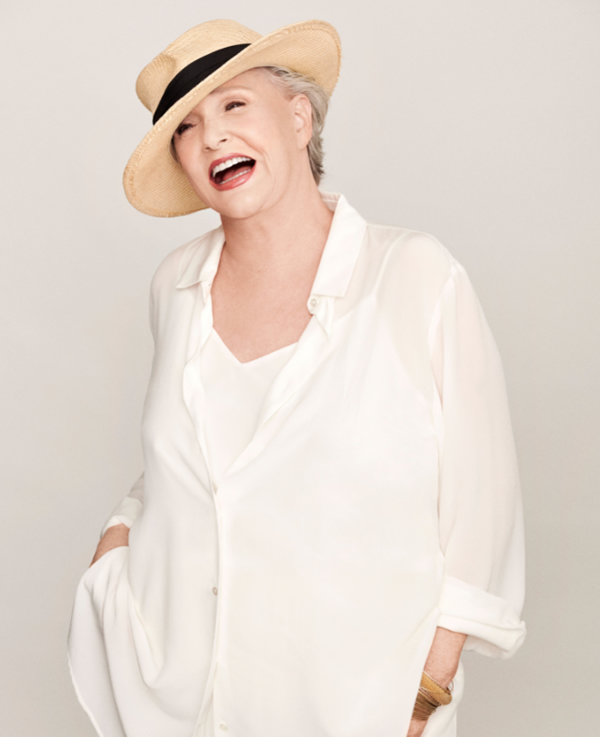
Arts & Entertainment
A Night of Legacy, Love, and Liberation: Inside the 2025 April Fool’s Ball
Ballroom culture continues to thrive among Black and Latin American queer culture

Late last month, the West Coast Ballroom Community lit up Los Angeles for one of the most anticipated events of the year — the April Fool’s Ball — produced by Legendary Father Markus Tisci. Now a staple of the L.A Ballroom calendar, the annual event is known not only for its high-caliber talent and unforgettable battles but for the legacy, love and chosen family it uplifts.
But let’s be clear: when we talk about “Ballroom,” we’re not talking about waltzing under chandeliers, we’re talking about the underground queer subculture birthed from the genius and resistance of Black and Latin American queer people — especially trans women and drag queens — in New York City.
Ballroom has since shaped and influenced mainstream culture, as seen in moments like Madonna’s “Vogue,” Beyoncé’s “Renaissance” and shows like “Pose” and “Legendary.” Today, that legacy continues to evolve and flourish far beyond New York, thriving in cities across the West Coast and beyond.
Markus Tisci has been a part of that movement for over 18 years and his roots trace back to the House of Rodeo — one of the West Coast’s most iconic original houses. In 2018, he founded the April Fool’s Ball with a simple but powerful goal: to bring laughter and creativity back into a space that was becoming, ‘a bit too serious.’ Conceived, produced and largely self-funded by Tisci, the ball is still known for its playful, pop culture — inspired categories that encourage imagination and joy.
Highlight the reel from the night of the House of Gorgeous Gucci.
This year’s April Fool’s Ball was filled with emotion, celebration, and remembrance. Just a few days earlier, the community laid Icon Devine to rest. The passing of the Queen of the West Coast Ballroom Scene and Legendary Mother of the West Coast Chapter of the House of Gorgeous Gucci left a deep void. For Ballroom Icon Jack Mizrahi, one of the night’s emcees and a foundational figure in Ballroom culture — as well as the father and founder of the House of Gorgeous Gucci — the event became a moment of both grief and healing.
“Seeing my house assembled, having each other to lean on, and the love we got from the whole West Coast Ballroom scene — it meant everything,” he shared.
In a powerful moment during the Legends, Statements and Stars (LSS) call — a time at the beginning of every ball when individuals are recognized and honored for their influence and impact — Mizrahi invited all trans women, whether they were walking or not — to step forward.
“Let the world know they deserve to be safe, protected, loved, and respected,” Mizrahi declared.
As the crowd cheered, those women (including the author) took their place with pride, their presence a radiant tribute to Icon Devine’s legacy and the enduring spirit of trans brilliance that Ballroom has always celebrated.
Fem Queen Parade at April Fools Ball 2025
The crowd erupted during the “Overall Face” final battle, where Jozea Flores — an up-and-coming Ballroom Legend in the House of Gorgeous Gucci — took home the grand prize of $1,000. In the “Face” category, contestants are judged on their natural beauty, expression, and how well they can ‘sell’ their face.
“When two stunning faces battle, you have to see who’s selling it more. That night, I sold it.” For Jozea, it’s about more than cash or trophies, though. “The energy from the crowd is my favorite part,” he shared. His message to the queer community: “Keep being true to yourself. Live boldly. Live loud.”
Royal Telfar Tisci, a fierce presence in “Gender Non-Conforming Runway,” also left their mark.
“It felt like old-school Ballroom energy,” they shared. “It was my first time walking at 5 a.m. — wild, but so worth it.” Royal walked with pride, earning their 10s and winning three battles.
“Runway is where we should shine. And that night, I did. But it raises the question — why aren’t GNC folks being included more consistently?”
As both a performer and advocate, Royal knows what’s at stake.
“There are forces trying to erase queer people, Ballroom, and especially the trans women who built it. We have to stay resilient, come together, and stay proud.”
Though Royal never lost to a competitor, the final battle and $3,000 grand prize was won by their chosen family member, Legendary Envy Tisci, the Bay Area Father of the House of Tisci.
“The night was long, but I enjoyed creating moments,” said Tisci. “I don’t get wrapped up in winning — I focus on the memories.”
Even as the night stretched into the early morning, the energy never faded. Destiny Ninja, Princess of the West Coast Chapter of the Iconic House of Ninja, delivered a voguing performance that closed the night with intention. She won “Women’s Performance” and after winning three battles, made it to the final battle in “Overall Performance.”
“I had so much to express and the runway was the perfect place to release it all,” she said.
The April Fool’s Ball continues to hold space for legacy and liberation. In the wake of Devine’s passing, the night became a reminder of the community’s strength.
“[Tisci] deals with applause, scrutiny and everything in between,” said Mizrahi. “And he still shows up. We need to stay united. Devine fought hard for visibility and respect. The West Coast needs to honor that — not with division, but with love.”
Tisci reflected on the night.
“Devine was a trailblazer—our Queen of the West Coast. Her impact still shapes the next generation. She’ll always be in our hearts. Tonight was about growth, legacy, and keeping the energy alive.”With the next major event — The Legacy Ball scheduled for June 1 — the community is already looking ahead. In a time of uncertainty and political hostility, the April Fool’s Ball re-affirmed what Ballroom has always been: not just a scene but a sanctuary. A home. A lifeline.
Arts & Entertainment
South Coast Repertory Theatre hosting world premiere production
Pride Night will take place on Saturday, April 19
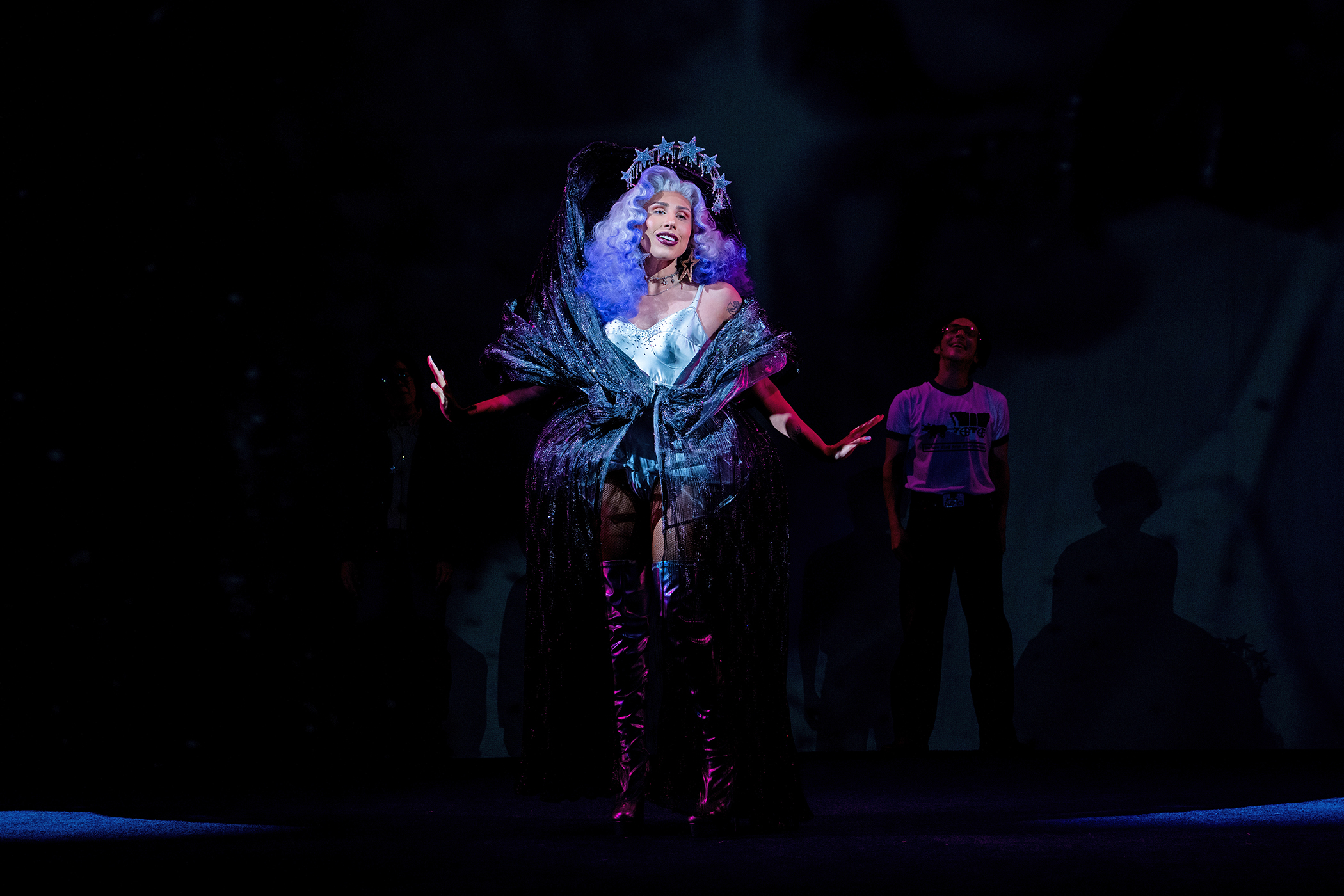
Costa Mesa’s South Coast Repertory Theatre hosted their opening night last weekend, bringing in a packed house.
There was an excited buzz in the air as the audience was seated to dance music from the disco to the present era, shiny stars and disco balls hanging from the ceiling, and club lights flooding the scene.
The audience was completely mixed, older and younger, fancy and casual, queer and straight, all in anticipation of this world premiere, from one of the most in-demand playwrights in the country, Keiko Green. Not more than three minutes after the lights dimmed, the audience realized this would be a show like no other.
In an explosion of reality and surrealism, the play is hard to label, much like the show’s non-binary main character and emcee for the evening, M.
The show centers around M and their journey of self-discovery, navigating through the modern world of tech and pollution, while dealing with the terminal illness of her father, M’s well-meaning mother trying to keep the family together and keeping her own grief at bay. It is a whirlwind of bigger-than-life characters and creatures, intimate moments and extreme pathos.
Using comedy as a main element, the play reels you into its real-but-not-real world, and the audience is easily transfixed by the story, through its extremely emotional and dizzying end.
Needless to say, you could hear a pin drop in the show’s final scenes, though sniffles could be heard and audience members wiping a tear or two away could be seen.
It is a comedy in disguise.
The show has a queer sensibility, especially manifested by the character of M, but it is not just a queer story. This play represents all of us and it is very fitting that the world is used as a metaphor for the proceedings.
Playwright Green masterfully uses laughter and grief as unifying themes. Laughter and grief are universal experiences that unify us all, regardless of sex, sexual orientation, class, race, or religion. The diverse audience at opening night was one entity by the end of the show.
The show comes at a time when we are thinking of the bigger picture, our place in the community, our place in the nation and our place in the world. Socially and politically, the world is a mess. And so is life. How you navigate it and find your place is how you survive. One moment at a time, one laugh at a time, one tear at a time.
South Coast Repertory will celebrate the queer community this coming Saturday on April 19th with a Pride Night performance.
Tickets include a pre-show event on the terrace, two complimentary glasses of wine, dessert and a live DJ. Meet a family (and a few friends) navigating love, loss, and climate change—with humor, heart, a little glitter and a touch of drag. A celebration of the beauty of the human spirit, even in the most unexpected moments.
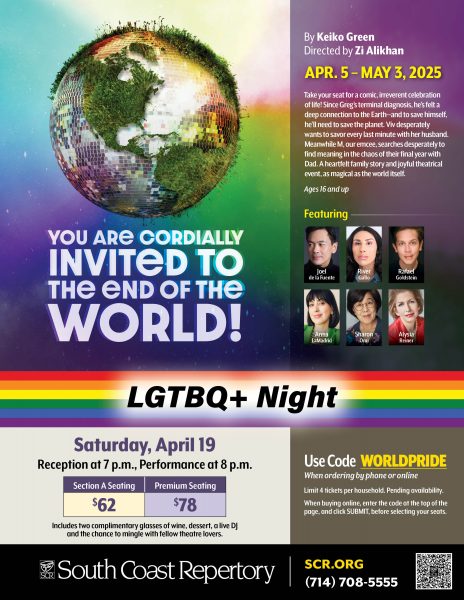
Get your tickets here, using discount code: WORLDPRIDE.
To win tickets through our ticket giveaway, enter here.
Arts & Entertainment
‘Bring it to Brunch’ returns to West Hollywood
Gird your loins! The long-running drag show is now back bigger and better for a residency at Rocco’s in WeHo
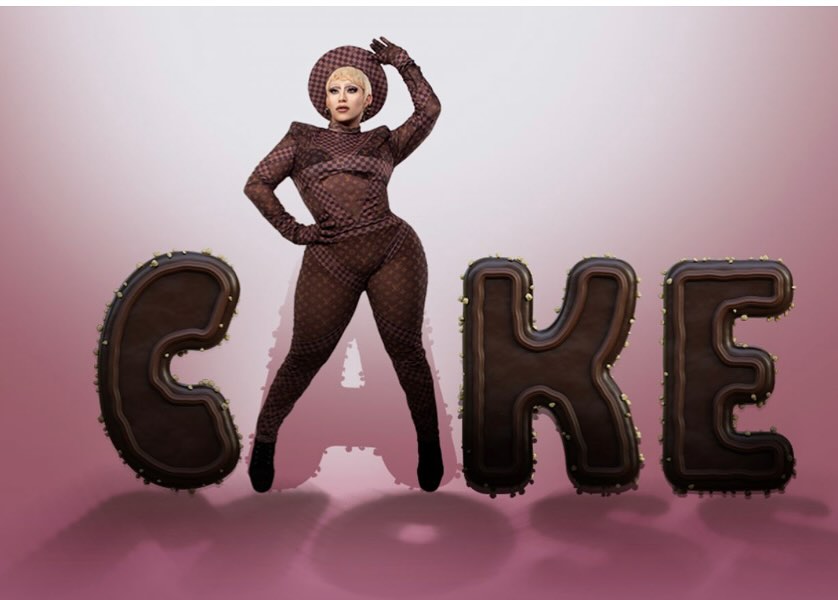
Bring it to Brunch, helmed by local drag maven Cake Moss, will make its return to West Hollywood at Rocco’s on April 19 at noon. The show has become a mainstay in the local queer community, starting at Flaming Saddles, then moving to Micky’s.
The show focuses on putting the spotlight on local talent and audiences continue to return as each show is filled with laughs and ‘lewks.’
Hailing from Cleveland, Moss has been serving it up with the drag community for over 14 years. She is a consummate performer and has hosted her own show on Outat.TV, released some sassy bops and performed around the nation.

Los Angeles Blade is a proud media sponsor of the show’s big return. See you there!
We chatted with Moss about her WeHo legacy, the return of Bring It To Brunch, queer nightlife and more!
How would you describe your drag?
I always have a hard time describing my drag. You’ll see through a show of mine. I always start out in a gown and huge hair, and the end of the show we are all shakin’ ass!
What do you love most about the queer club scene in West Hollywood?
What I love most about the queer scene in WeHo is just that—we have a whole neighborhood of queer spaces, for queer people of all walks of like! You can go watch sports, go to a dive bar, go to a big club, go be ‘bougie,’ or just live your best fantasy.
What sets Bring it to Brunch apart from other drag shows?
What I personally think sets my show apart is the casting process I have in place and the fact that I have a different cast every week!
Bring It To Brunch is getting a reboot at Rocco’s! What can audiences look forward to in the new venue?
I’m so excited and honored to get to my baby back at Rocco’s. The new owners and management are so supportive and excited it makes me even more lit to start! We are gonna have new drink options.
I changed the format a little bit, but it will still be doing what we usually did! Prize giveaways, sponsors and special celebrity guests! It’s always a gag at brunch!
What is most important to you in putting together each week’s cast?
Diversity! There are sooo many drag entertainers here in SoCal (I also book people from all around the world), so it’s important for me to give a stage to people that normally don’t have the chance to show their art off in West Hollywood.
Who is kicking off your first show at Rocco’s and what do you love most about this cast?
My [drag] sister Melissa BeFierce. She is always supportive of me and looking out for each other she’s been one of my longest friendships here in L.A! My [drag] daughter Jenna Talls is beautiful and also very supportive of me and our community. I have my [drag] sister Kyra Jete, she is the weekly host of Fierce Fridays at Rocco’s and is also one of the Rocc-ettes! So I thought, ‘why not show the crowd some house talent to show what Rocco’s has to offer entertainment-wise?’
And rounding off the cast is Thierry Miesel! She’s a very talented gem. We go way back and she is coming out of her hiatus. I wanted to show her that WeHo is still kickin’!
What are the biggest challenges facing local drag queens in this political and social climate?
I’d say forms here in Los Angeles we are very privileged to be in a place so open and accepting? I’d say that we need to use our voices to help support our fellow sisters in places where legislation is attacking them personally. All of our voices count and never forget that they can always be heard!
How can we best support our drag community?
Support is very easy. If you can come to the show and support, cheer and love—those are free. If you can’t come to the show, that’s OK. Share the flier in your story for a friend or tell a friend who also enjoys drag. Also free! But if you can, make it rain on a b-tch and buy some drinks.
What is your message to the Los Angeles LGBTQ community?
QUIT TEARING EACH OTHER DOWN.
We have to stick together more than ever now and it’s insane the little things people will fight and be hateful about. Save that energy for the administration. Being cordial is free.
Bring it to Brunch kicks off every Saturday, starting on April 19 at Rocco’s in West Hollywood. Doors open at 12:30 p.m.
a&e features
Peppermint thrives in the spotlight
In this exclusive interview, Peppermint talks about her latest work in activism and acting
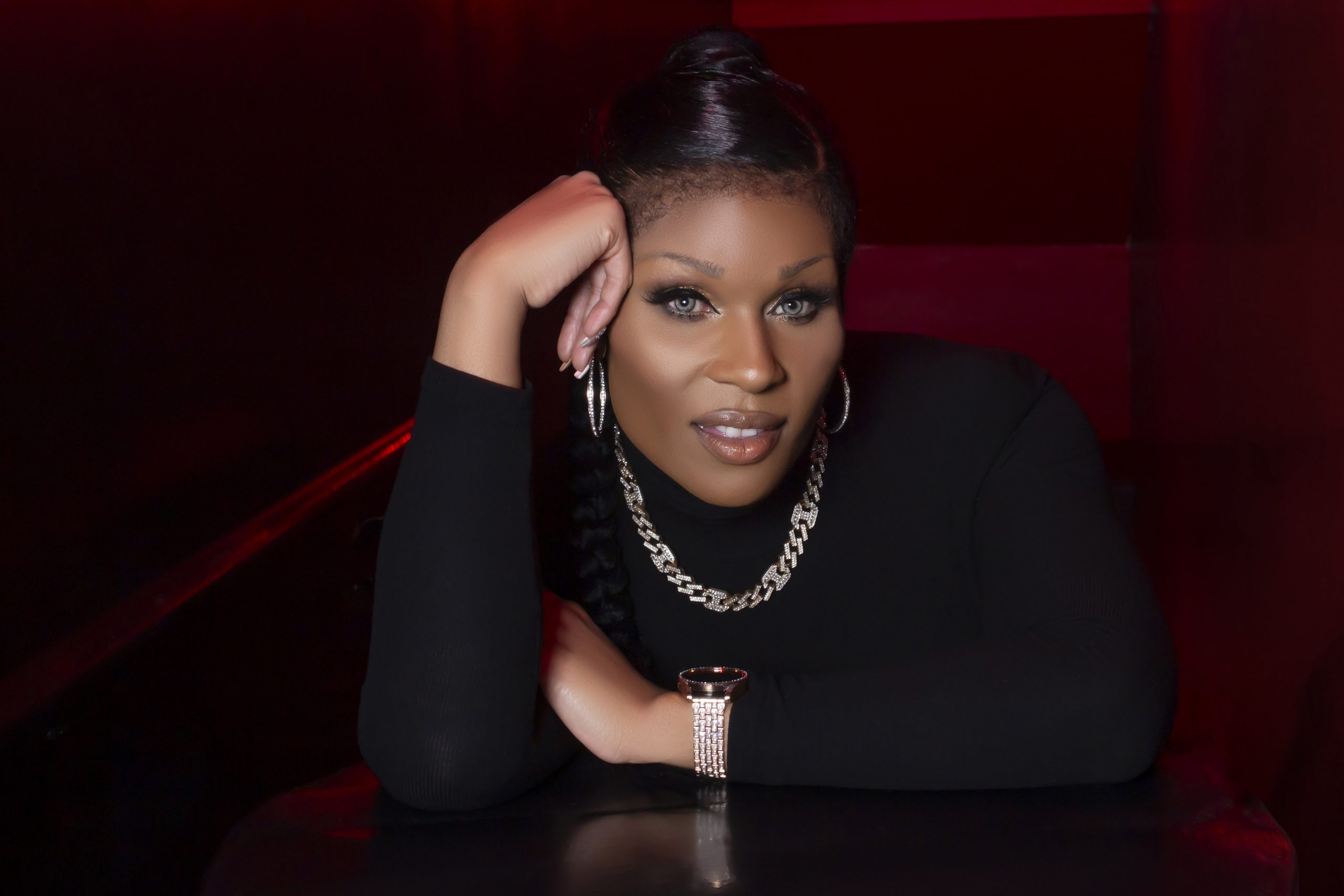
As an entertainer, there’s not much that Peppermint hasn’t done. She’s a singer, actor, songwriter, reality TV personality, drag queen, podcaster and the list goes on. Most importantly, as an activist she has been an invaluable role model for the trans, queer and Black communities.
She’s a trailblazer who boasts an impressive list of ‘firsts.’ She is the first out trans contestant to be cast on “RuPaul’s Drag Race” (Season 9). She is the first trans woman to originate a principal musical role for Broadway’s “Head Over Heels.” She was also the first trans woman to compete in the runaway hit series “Traitors,” on Peacock, and she is the ACLU’s first-ever Artist Ambassador for Trans Justice. Her accolades are a true testament of the courage it took for Peppermint to live her authentic self.
We caught up with Peppermint to chat about her activism, taking on bigger roles on screen, our current political and social climate and life beyond the lens. For Peppermint, coming out as trans was not just a moment of strength—it was a necessity.
“It unfolded exactly as I had imagined it in terms of just feeling good and secure about who I am. I was in so much pain and sort of misery and anguish because I wasn’t able to live as free as I wanted to and that I knew that other people do when they just wake up. They get dressed, they walk out the door and they live their lives. Being able to live as your authentic self without fear of being persecuted by other people or by the government is essential to being healthy,” Peppermint tells the Los Angeles Blade in an exclusive interview.
“I was not able to imagine any other life. I remember saying to myself, ‘If I can’t imagine a life where I’m out and free and feeling secure and confident and left alone, then I don’t even want to imagine any kind of a life in the future,'” says Peppermint.
Recently, Peppermint returned for season 2 of Netflix’s comedy “Survival of the Thickest.” She added some spice and kick to the first season in her role as a drag bar owner. This time around, her character moves center stage, as her engagement and wedding become a major plot line in the show. Her expanded role and high-profile trans representation come at just the right time.
“It’s the largest acting role I’ve ever had in a television show (which my acting degree thanks me). It feels right on time, in a day where they’re rolling back trans rights and wanting to reduce DEI and make sure that we are limited from encouraging companies, corporations, industries, and institutions from not only featuring us, but supporting us, or even talking about us, or even referencing us.
“It feels great to have something that we can offer up as resistance. You can try to moralize, but it’s tougher to legislate art. So it feels like this is right on time and I’m just really grateful that they gave me a chance and that they gave my character a chance to tell a greater story.
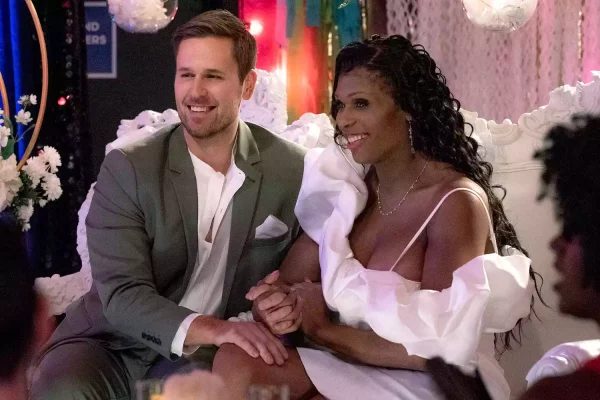
Dan Amboyer and Peppermint on ‘Survival of the Thickest’ Season 2.
(Photo credit Vanessa Clifton/Netflix)
Peppermint’s expanded role also accompanies a boom in queer representation in Black-powered media. Networks like BET and Starz and producers like Tyler Perry, are now regularly showcasing queer Black folks in main story lines. What does Peppermint think is fueling this increased inclusion?
“Queer folks are not new and queer Black folks are not new and Black folks know that. Every Black person knows at least one person who is queer. We are everywhere. We have not always been at the forefront in a lot of storytelling, that’s true, and that’s the part that’s new. It’s Hollywood taking us from the place where they usually have held us Black, queer folks in the makeup room, or as the prostitute, as an extra—not that there’s anything wrong with sex work or playing a background performer. I’ve played the best of the hookers! But those [roles] are very limiting.
“Hollywood has not historically done and still does not do a very good job of, including the voices of the stories that they make money [on]. And I think they’re realizing [the need] to be inclusive of our stories and our experiences, because for a long time it was just our stories without our actual experiences. It’s also exciting. It’s dramatic. It makes money. And they’re seeing that. So I think they’re just dipping their toes in. I think that they’re going to realize that balance means having us there in the room.”
Peppermint’s activism is tireless. She has raised over six figures for prominent LGBTQ rights groups, she continues to speak around the nation, appears regularly on major media outlets addressing trans and LGBTQ issues and has been honored by GLAAD, World of Wonder, OUT Magazine, Variety, Condé Nast and more—all while appearing on screen and onstage in a long list of credits.
Now, under the Trump Administration, she doesn’t have time to take a breath.
“I wouldn’t be able to do it if it weren’t second nature for me. Of course, there are ups and downs with being involved with any social issue or conversation and politics. But I am, for now, energized by it. It’s not like I’m energized by like, ‘Ooh, I just love this subject!’ right? It’s like, ‘Oh, we’re still being discriminated against, we gotta go and fight.’
“That’s just what it is. I get energy because I feel like we are quite literally fighting for our lives. I know that is hyperbole in some regards, but they are limiting access to things like housing, healthcare, job security and not having identification. Passport regulations are being put in a blender.”
Peppermint also mentions her thoughts on the unfair mandates to remove trans military members and revoke the rights and resources from the veterans who worked their whole lives to fight for this country.
“When you strip all these things away, it makes it really difficult for people to have a life and I know that that is what they’re doing. When I look around and see that that is what is at stake, I certainly feel like I’m fighting for my life. And that’s energizing.
“The only thing that would be the most rewarding besides waking up in a utopia and suddenly we’re all equal and we’re not discriminating against each other—which probably is not happening this year—is to be able to be involved in a project like this, where we can create that world. It’s also being built by people who are a part of that story in real life and care about it in real life.”
Peppermint is clear on her point that now is the time for all of the letters of the LGBTQ community to come together. Everyone who is trans and queer should be joining the fight against the issues that affect us all.
“Just trust us and understand that our experiences are tied together. That is how and why we are discriminated against in the way[s] that we are. The people who discriminate—just like how they can’t really distinguish between somebody who’s Dominican and somebody who’s African-American—you’re Black when you’re getting pulled over. We are discriminated against in much the same way. It’s the same with being trans or queer or gender non-conforming or bi, we all have our own experiences and they should be honored.
“When laws are being created to harm us, we need to band together, because none of y’all asses is gonna be able to stop them from getting rid of marriage equality—which is next. If you roll the tape back to three years ago when somebody was trying to ask me about drag queen bans on readings in school, I was saying they’re coming for trans rights, which comes for bodily autonomy and abortion rights, which comes for gay marriage rights. Those three things will be wiped out.
Peppermint doesn’t take a pause to get fired up and call gay folk out in their obligation to return the favor to the Black trans community.
She shares with us her final thoughts.
“You cis-gender homosexuals need to stand the f–k up and understand that we are standing in front of you. It’s very difficult to understand this and know this, but so many of the rights that we have were hard fought and won by protest and by people fighting very hard for them. And many of those people in every single instance from the suffrage movement, obviously Civil Rights, queer rights, the AIDS and HIV movement—Black queer people have been there the entire time. Trans people have always been a part of that story, including Stonewall. Yes, we are using different terminology. Yes, we have different lenses to view things through, but let me tell you, if you allow us to be sacrificed before you see us go off the side, you will realize that your foot is shackled to our left foot. So, you better stand the f–k up!”
Peppermint for President!
a&e features
Musical Mondays, a mainstay in WeHo nightlife, celebrates 16 years
MuMo will be honored by the City of West Hollywood for its dedication toward the arts
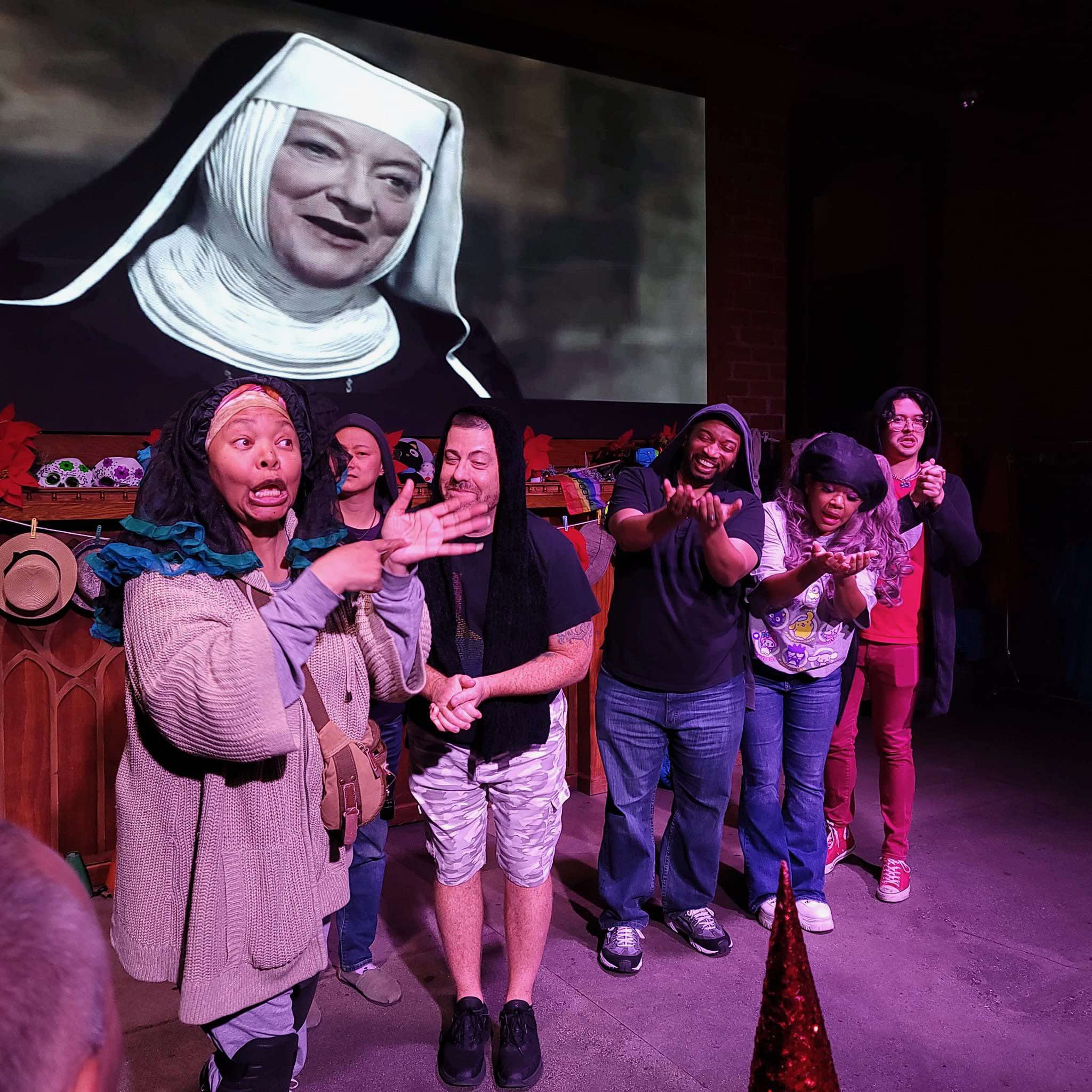
MuMo will be presented with a Proclamation from the City of West Hollywood for Service to the Community.
Nearly every Monday night for 16 years, throngs of musical theatre lovers, from the LGBTQ community and beyond, have gathered together to celebrate the arts and community. MuMo has become the ideal safe and creative space with a diverse crowd that reflects the Los Angeles community. Everyone is welcome as MuMo go-ers sing along to video clips from Broadway, movies and more, while some of the crowd get up and shadow cast what’s happening on the screen.
The evening, now residing at The Chapel at The Abbey, culminates in “The Live Spot,” featuring some of the best live performances L.A has to offer. Headliners change every week, ranging from cast members from Broadway national touring shows, to local theatre members, to names from the cabaret world. This is where theatre professionals come to play.
The energy and love in the air are electric and for many, this is the one night during the week that everyone can escape and shut out the trials of the outside world and immerse themselves in love, laughs, and musical magic. MuMo fans are fierce and loyal. As part of the “Your Name Under the Stars” initiative at The Hollywood Bowl, the crowd raised funds to have brass plaques put on three seats in section Q1. These plaques read “Musical Mondays Los Angeles”, “The Fans of MuMo,” and “And one for Mahler!”
Some of Broadway’s best–including a few Tony Award winners–have joined MuMo in the audience and on stage. Broadway legends like Neil Patrick Harris, Lin-Manuel Miranda, Billy Porter, Laura Benanti, Sutton Foster, Alex Newell, Valerie Pettiford, Obba Babatunde, Lillias White, Corbin Bleu, Matt Lucas, Megan Hilty, Jai Rodriguez, Terri White, Davis Gaines, Gedde Watanabe, Michael Feinstein, Bruce Vilanch and Blake Hammond have stopped by to enjoy the show.
On April 21st, MUMO will be presented with a Proclamation from the City of West Hollywood for Service to the Community, organized through the offices of Assemblymember Rick Chavez Zbur (AD-51) and WeHo City Council Member Danny Hang.
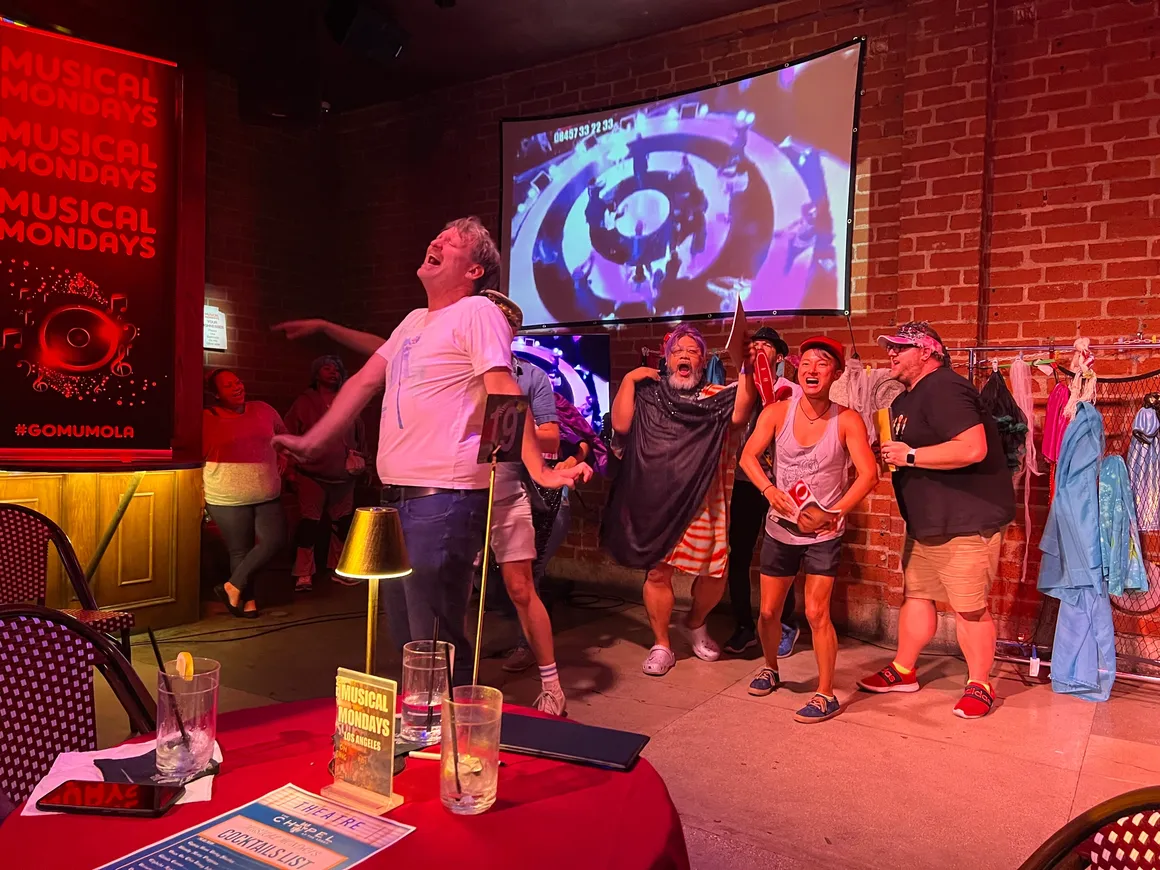
Photo credit MUMO
The masterminds behind MuMo are Ishka Maher, a long-time and fierce ally of the queer community and the evening’s emcee, Darin Sanone, a veteran in showbiz. The two of them make a veritable team as they continue their mission to provide a safe space for all to come and celebrate the arts. We caught up with them in anticipation of their big anniversary celebration.
Ishka Maher:
What was your inspiration for starting Musical Mondays?
We started Musical Mondays because there was simply a need for a theatrical musical event in WeHo. No one else was doing it or realized there was such an interest. What it’s grown into is very organic.
Musical Mondays has such a die-hard fan base that has been long-lasting. What makes the event so popular?
Our fan base has grown with the night. They grew with us. They are a part of who we’ve become.
What is it about musicals that brings everyone together?
Musicals are emotional magic. Unlike stories told on the screen, an audience watching a musical is encouraged to react and be a part of the action. It is emotional crowdsourcing.
What has been one of your favorite memories from Musical Mondays?
Every single week, there is a moment of joy when I get to witness a performer realize they’ve rocked it. Or the fans of MuMo have the audience howling with laughter. Or the bravery of a first-time singer. Or a group of friends meeting up in their favorite corner every week. These things bring me joy. Big events like our “Wicked” show nights, I’ll always remember.
What do you want audiences from Musical Mondays to walk away with the most?
When our audience walks away I want them to have felt like they’ve been a part of something special and unique. And to feel seen and welcomed into our goofy MuMo family.
What can we expect from Musical Mondays in the future?
I’m working constantly for our unique event to stay strong and be a part of the community. I know we have a strong fan base but I love it when celebrities and casts from touring shows hang out with us. I hope for more of that.
What do you love most about working in queer nightlife?
I’ve been working in the gay community of WeHo for 35 years. I feel blessed. It’s always dynamic, and you never know what to expect.
What is your message to Musical Mondays fans?
I want MuMo Fans to know that the night is strong in this space. We have the support of the Abbey and their amazing staff, and we plan to build on what we’ve been doing so successfully. It’s my favorite night of the week!
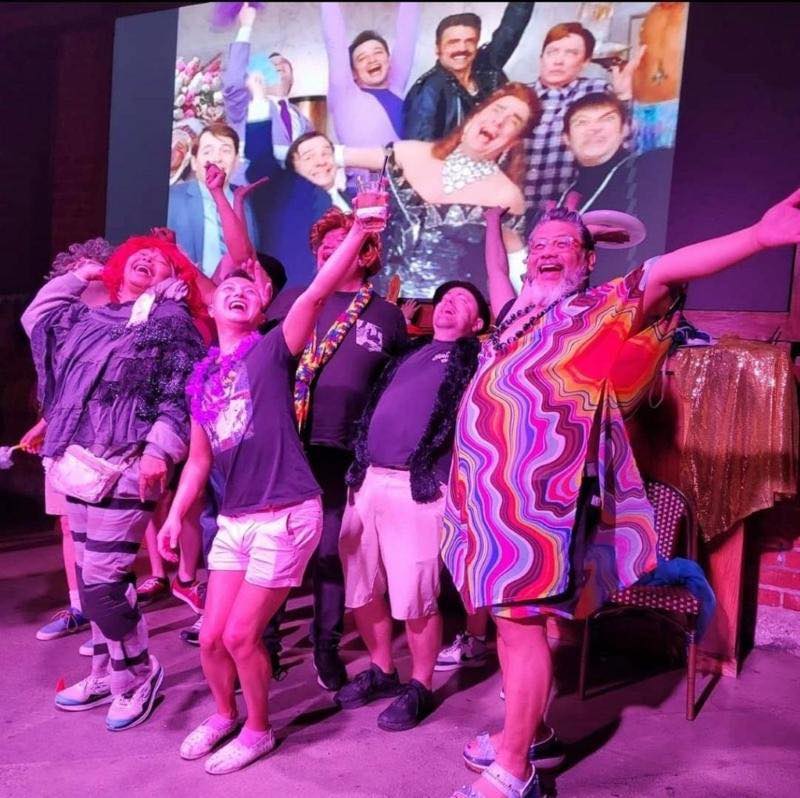
Photo credit MUMO
Darin Sanone:
You have been on stage and behind the scenes in Weho for quite a while. How has nightlife changed the most?
I have been on stage and behind the scenes in Weho for 26 years. Nightlife has changed tremendously. When I started in Weho in 1999 the vibe was definitely the circuit vibe. The Music was fast and hard and the party scene was fast and hard. Drugs were the norm and widely used. The bars were packed and people went out to meet potential dates or relationship candidates. Now people go out to dance or drink and leave dating and relationship searches to Apps on their phones. The music has changed, and so has the culture. Hip-hop is the preferred music of the people in clubs, and weed is the preferred substance to escape. People still drink alcohol, but they usually pregame at home or in their cars, and weed is much more popular than designer drugs or alcohol. Bar owners have to really work hard to get people into the clubs and then to get them to buy drinks. Without promoters and promotions, clubs cannot survive. Since Covid-19 almost every bar [and] nightclub in WeHo has changed ownership at least once. Some have changed owners twice and are well on their way to a third owner.
You are the emcee extraordinaire for Musical Mondays. What do you love most about doing this event week after week?
It is the highlight of my week!
The thing I love most about doing the Musical Mondays every week is the people! We get the best singers in L.A every week at Musical Mondays, both in the Live Spot Singer Showcase and after for Broadway Karaoke. It is the most accepting and supportive crowd in all of WeHo. Many people can feel intimidated by the West Hollywood crowd and scene. At Musical Mondays, everyone is welcomed and embraced. No one is made to feel less than. Almost every week, I am brought to tears by the singers who grace our stage. I have been a musical theater lover my entire life and have been performing musical productions since I was a very young child. The musical is the greatest contribution to the giant umbrella of music America has made. I love Musical Mondays and am grateful to be a part of the musical magic that happens at the Chapel every Monday night!
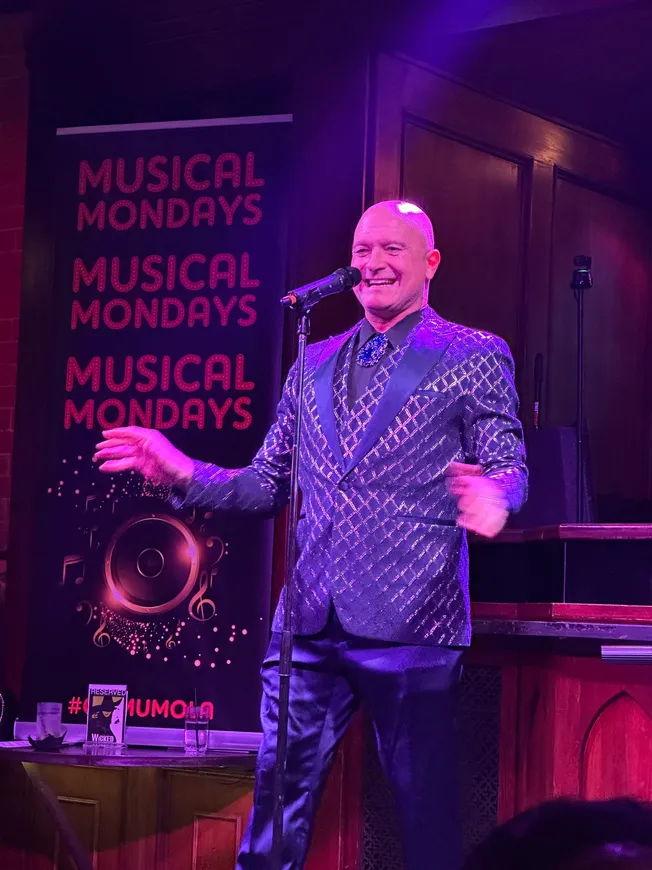
Photo credit Darin Sanone at MUMO
In your opinion, what makes Musical Mondays so popular in the community?
I believe what makes Musical Mondays so popular in Weho is a quadruple combination! This is our secret recipe! First, we have an amazing sound team. Keith Jacobson spins the best in Broadway and movie musical clips, and Greg Watkins is the best sound engineer in all of Weho! Greg makes every singer and musician sound phenomenal. I have had the pleasure of working with Greg on shows I have produced and hosted for 23 years. There is no one better in L.A! Our Second secret ingredient is the Fans of MuMo! The Fans of MuMo evolved organically back when Musical Mondays was at Club 11. The Fans, or as we sometimes call them, the “MuMo’s,” perform lip sync comedy routines to almost every video Keith plays. They are the most unique and talented crew of actors you will find in California, and they show up every week and pour their heart and soul into every Monday night. The third secret element to our success is the Live Spot, which is where I join the show. The Live Spot is a singer showcase with professional singers from L.A and the world. We have all of the best local musical productions showcasing their shows and many of the Broadway National Tours that pass through L.A! The caliber of singers [and] actors in our Live Spot is paralleled only by Broadway in New York City. The final ingredient to Musical Mondays’ success is the Broadway Karaoke segment. You never know who might show up for our Karaoke portion! We get professional Broadway and film actors, karaoke die-hards, influencers, drag superstars, beginning singers and a rainbow of beautiful souls! It is the most supportive community you will ever find at a karaoke event. Everyone shines!
Why is celebrating musicals so important right now?
Celebrating musicals is so important right now for many reasons. Most importantly is the fact that the LGBTQ community is under assault in America right now.
Secondly, musical theater embraces and celebrates diversity. It is 100% supportive of the LGBTQ community and of all races in our globe. As America moves back toward racism and homophobia, Broadway marches forward, spotlighting racial diversity and sexual identity inclusion. Music and the musical unite people in love through song and dance.
As a performer, how do you feel with politics getting so involved with the arts right now? How do we fight back?
Politics has always been so involved in the arts. The best music is political. The best theatre is political. Politics is what fuels much of the arts. The Beatles, U2, Marvin Gaye, Bob Marley, Bob Dylan, Nina Simone, Pink Floyd, Willie Nelson, Johnny Cash, Crosby Stills Nash and Young, Bruce Springsteen, Joan Baez, The Sex Pistols, Green Day, The Police, Madonna, and Lady Gaga are all famous because they were and are political.
ART IS POLITICAL! MUSIC IS POLITICAL IF IT’S GOOD! THEATER IS POLITICAL IF IT’S GOOD!
We fight back by voting, protesting, boycotting and most importantly by loving.
What do you love most about working in LA queer nightlife?
What I love most about working in WeHo nightlife is the beautiful colors of the rainbow. WeHo is for everyone, not just the LGBTQ community. West Hollywood has become much more like Europe in the last 25 years. The LGBTQ community now parties with the straight community. Nobody in the younger generations cares a bit what someone does in the bedroom. The youth of America don’t segregate themselves. The only way the LGBTQ community will survive in America during this dangerous time is if our straight friends stand up for us. We must allow our WeHo spaces to be safe for all of the rainbow. If WeHo doesn’t embrace everyone, especially our straight allies, the LGBTQ community will be in concentration camps wearing pink stars or worse. The greatest power is love. WeHo nightlife is ever evolving and as Darwin teaches us, survival happens for the most adaptable.
Adapt or perish!
Embrace all of the people. Musical Mondays is for everyone Gay, Straight. Bisexual, Trans, Black, White, Brown, and Pink! We are the Pink Pony Club–never forget that.
What is your message to Musical Mondays fans?
Thank you for supporting me, live performance and the greatest contribution of America to the genre of music–the Broadway Musical.
God bless WeHo! God Bless America! God bless Musical Mondays!
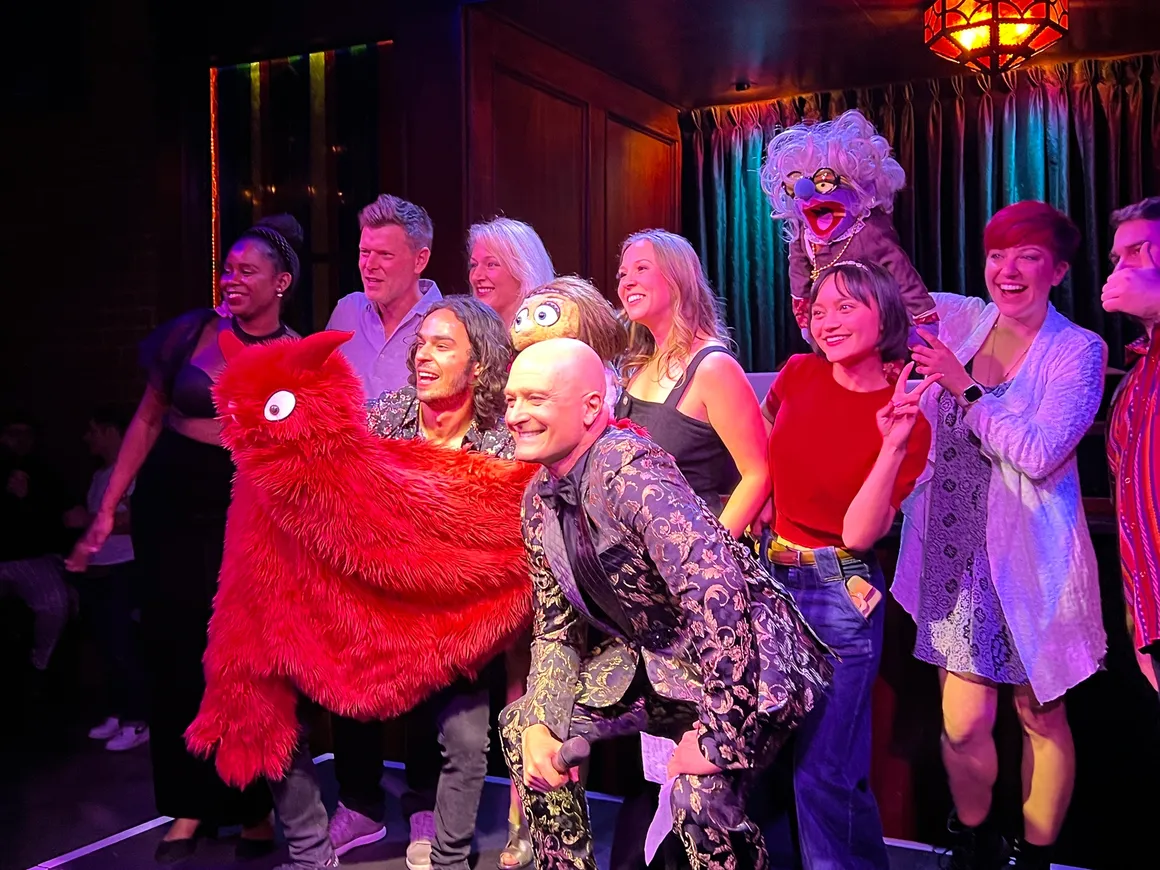
Photo courtesy of MUMO
For more information on MUMO, head to MuMoWeHo.com
Arts & Entertainment
LA Opera brings back Pride Night with a production of ‘Ainadamar’
Pride Night returns at the LA Opera

LA Opera is bringing back its Pride Night on Wednesday May 7, in partnership with the Opera League of Los Angeles.
LGBTQ members and allies will come together for Pride Night to indulge in a performance of “Ainadamar,” at the Dorothy Chandler Pavillion. The discounted tickets for Pride Night include access to a complimentary post-show party at Vespaio hosted by the Opera League of Los Angeles, featuring Cal-Italian bites from Chef Agostino Sciandri.
“Ainadamar” is a tribute to Spanish poet and queer icon, Federico García Lorca.
“This season, we celebrate with ‘Ainadamar,’ a powerful tribute to Spanish poet and queer icon Federico García Lorca. These pairings matter. They highlight that opera is a living, evolving art form—one that speaks to all people and reflects the diversity of the world we live in,” said Christopher Koelsch, president and CEO of LA Opera.
The central plot of “Ainadamar,” which is the Arabic meaning for ‘fountain of tears,’ follows Ana María Martínez as Margarita Xirgu, an actress who spent half of her career portraying Mariana Pineda, who was a 19th-century Spanish liberalist heroine, in Lorca’s play. Pineda was a political martyr who was executed for embroidering a flag with the slogan “Equality, Freedom and Law,” in protest of the absolutist Spanish regime.
The production, running at approximately one hour and 20 minutes, sets the stage with a throwback, recounting Lorca’s life and his last days in the Spanish Civil War.
“At the heart of our Pride Night celebration is the belief that everyone should feel seen onstage and off. Opera is a space for community and belonging, where our audiences can recognize themselves not only among fellow attendees, but also in our artists, our music and the stories we tell,” said Koelsch.
This major company premiere, led by resident conductor Lina Gonzáles-Granados, is sung in Spanish, with English and Spanish subtitles. Grammy-winning composer Osvaldo Golijov produces the dramatic, flamenco-inspired score that meets the poignant libretto by David Henry Hwang.
During the COVID-19 shutdowns, live performances at the LA Opera were put on hold and the journey to bring back Pride Night, among many other in-person performances, was a struggle filled with many moving parts.
“COVID-19 suspended live performances across the board and during our return season we were navigating the different timelines for audiences returning to live theater. It was very much a matter of listening to our community and learning what had changed for them as well as us: some opted for livestream options, others preferred only outdoor events, and so on,” said Koelsch. “Once we found our stride, we were excited to bring back Pride Night the following season during ‘The Marriage of Figaro.’”
This year the LA Opera is celebrating their 40th anniversary by launching their 40th Anniversary Campaign to raise resources needed to continue funding their organization.The show opens on Saturday, April 26 and runs through May 18. Purchase tickets by clicking here.
a&e features
No longer just a go-go dancer, Prince Joshua debuts ‘Crowned’ EP
This WeHo go-go dancer and socialite shares his life beyond the dancing box
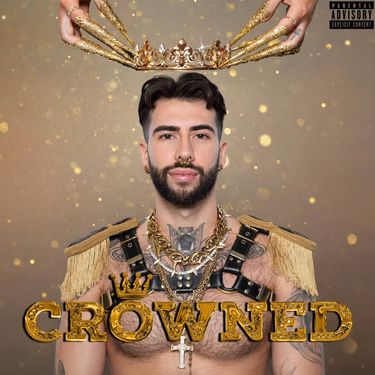
In this new “Meet Your Locals” column, we highlight the journey of a talented local dancer and emerging musical artist as part of Los Angeles Blade’s mission to get to know our community, we continue to do a deep dive into the personalities who make up the queer culture of Los Angeles.
Across queer bars along the West Coast, audiences and nightlife enthusiasts have come to appreciate Prince Joshua’s electrifying dance performances during his go-go sets. While renowned for his impressive dance skills, Prince took a career pivot last year by reintroducing himself as a musical artist with the release of “Coochie” by Baddie Gang.
In January of this year, Prince released his debut EP, “Crowned.” The project offers a deep dive into his personal experiences within nightlife culture, touching on themes such as navigating catcalling, dating, celebrating life and more.
We sat with Prince Joshua to get the exclusive insight on his new music.
Tell us your story of moving to LA:
I had always dreamed of moving to Hollywood and being on stages entertaining people. It’s amazing to fast-forward to living that exact lifestyle with dancing at bars like the world famous Abbey [bar] every weekend and entertaining my community as my job. Growing up in a small conservative town I never felt like the world was made for someone like me, the world I grew up in was made for heterosexual people who live ordinary lives. As I grew into the eccentric and charismatic homosexual that I am, I realized I needed to live somewhere where the things I was bullied for, would be celebrated. West Hollywood was made for people like me, people who dress up to express themselves, who aren’t afraid to be unapologetically themselves, and most importantly genuinely be who they are.
What do you love most about life in LA?
I love being surrounded by people with as much ambition and dreams as I have. There’s so much room in the sky for every star to shine and it makes me so excited when I hear that my friends are working on something new to achieve their goals and dreams. We’re all out here putting in hard work to make our art stand out and be seen, being around so much creativity and creatives helps push myself to chase my own dreams and hustle to achieve them.
Many people know you for your dancing, What got you into making music?
I’ve always had a love for poetry and have written songs and poems before, but my friend Tokeyo really pushed me into making music when he asked me to feature a verse on his song “Coochie.” I have such strong love for hip-hop and rap that once I learned the process of making my own verse, I wanted to continue making more. I began finding beats and writing songs which lead me to release my first EP with six songs and three music videos.
Who is your favorite artist?
None other than the queen of rap herself – Nicki Minaj. From her undisputed discography of hits, iconic visuals and unique delivery, she has inspired all of today’s current rappers from her use of voice animation, flow switching, metaphors and punch lines all in a perfectly constructed way.
Who is your favorite queer artist?
Kim Petras has been one of my favorite pop girls since 2018. When I heard heart to break I instantly loved the artist. “Turn Off The Light” projects volumes one and two are some of my favorite works of hers. Spooky horror inspired pop music & she’s queer – it can’t get any better than that!
What do you hope to accomplish with your music?
I hope to give anyone who listens to my music the confidence to unapologetically be themselves and bust a move. I want people to dance, be themselves and not be ashamed by doing so. I used to get insecure when others would hear what music I listened to or saw me dancing or singing along, but I’ve learned something that has really reshaped my thoughts on that; no one’s opinion matters but your own, if it brings you joy and doesn’t harm anyone in the process, then go for it!
What do you love most about performing in the queer LA nightlife?
I just love the energy and fashion from my community. Seeing the incredible outfits of each individual expressing themselves their way with their own aesthetic is such a beautiful sight. When people see how hard you hustle and how much work you put into your art it’s an amazing feeling to see a crowd sing along, dance, or even stand shocked at what I’m doing on the stage. Just like Lady Gaga’s iconic, “I Live For The Applause.”
What are some misconceptions people have performers in LA?
A lot of people mistake dancers for porn stars and while they both have some similarities, not every dancer is a porn star and vice versa. Coming from a cheer background I put so many elements into my dancing and rap performances, such as kicks, splits, toe touches, etc. It’s so much more work than just having a nice body. While I respect and appreciate what porn actors do, I wish people wouldn’t put go-go dancers and porn actors in the same categories as they usually do. We entertain in very different ways, both taking a lot of hard work, but still very different worlds.
What are your favorite places to perform and why?
I love performing for music festivals. OutLoud’s WeHo Pride is one of my favorite events where I’ve not only had the opportunity to go-go dance but also perform my own music on stage. Seeing so many people in the crowd, being part of a sickening line up and getting to go all out in my ‘Princely’ way brings me a feeling of accomplishment and adrenaline like none other.
SUMMERTRAMP is another queer festival I’ve had the chance to perform at which I’m so grateful for. Every time I get to share my music to my community if I inspire just one person in the crowd to smile, dance, or embrace their inner selves then I know I’ve done my job.
How does being queer inform your music?
As I’ve stated before, this world was made for heterosexual, ordinary people. My music is made to take you out of that pouring world and into my eccentric queer and royal fantasy. Not many queer people can relate to the regular top 40 songs because they are all from a heterosexual lens. With my music, I hope that people can relate to my experiences or at least my experience as a queer person and be able to embrace their sexuality by giving them music that is made for them.
How do you balance your personal life with your professional life?
When you are chasing a dream while hustling as an entertainer your entire life is consumed with said dream. In my free time I am often stretching, working out, writing new music, or planning my next music video or photo shoot. My passion is my job so I never feel like my personal life is suffering when I’m consumed with working on what I love to do, but making sure I give myself time to rest and recharge is a vital key to ensuring I don’t burn out. I try to always give myself one day a week where I don’t focus on work or projects and allow myself to rest and recharge.
Any advice to people who want to start making music or dancing?
Just go for it! You’re always gonna be your own worst critic, but at the end of the day, you will see so much growth when you just allow yourself to put out the art that you’ve created and continue making new art. Find a support group that can help you level up whatever it is. You’re passionate about and continue pushing yourself to be better than you were the day before.
What’s next for your music career?
Right now im working on my next EP and I’m so thrilled because I know it’s better than my first. Being able to see my own growth inspires me so much to keep creating. You can also expect some collaborations with other up and coming queer artists!
What message do you have for the queer community?
Every day you wake up, you have the chance to genuinely be yourself and encourage others to do the same. While there’s so much in this world working against us, there are so many of us in the community to lean on and look for support when you feel alone. Be unapologetically yourself, stand strong with your friends and family within the community and take up as much space as you can by using your voice, sharing your art and being yourself.
To keep up with Prince, follow him on Instagram.
Rose Montoya is a renowned, award-winning, Trans, Latina, writer, advocate, educator, model, actor and viral content creator.
a&e features
Fashion icon Isaac Mizrahi brings performances to the West Coast
The legendary fashion designer and entertainment icon Isaac Mizrahi to perform in California
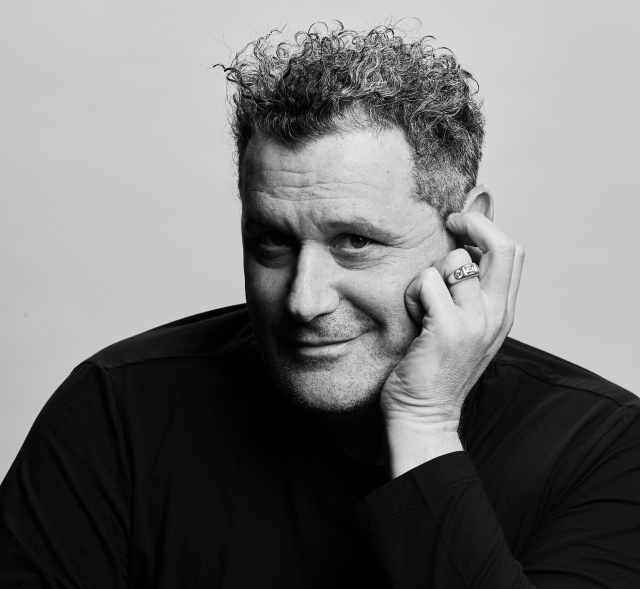
Isaac Mizrahi’s talents are many, equally at home in the worlds of fashion, entertainment and theatre. As a designer, he redefined elegance and innovation, making his mark with iconic collections and runway shows. But Mizrahi’s artistry doesn’t stop there. He’s captivated audiences as a Broadway star, a beloved television personality and a multifaceted performer with a gift for storytelling and humor. His unique ability to seamlessly blend wit, charm and deep creative expression, has earned him fans across every medium he touches.
Now he’s taking his talents back to the stage with an exciting new cabaret tour.
Ahead of his anticipated tour, we sat with Mizrahi to talk about his artistic process, stepping back into the spotlight and what to expect from his upcoming performances.
Can you give us a taste of your conception process? Share with us some of the inspiration for your upcoming show.
Though I think my act plays as well on a larger stage as it does in a cabaret, I think about the show I do as something that changes a lot the way a cabaret show does. My process starts with collecting ideas and writing monologues which I internalize, and which are always evolving. The music rehearsals are really important, in terms of coming up with arrangements that sound fresh. Also there’s a chemistry I have with the musicians that motivates me to express myself, to entertain them, make them laugh.
When did you first get the itch to step into the spotlight and how did it feel to step onto the stage for the first time?
You might know I was a trained performer before I was a clothing designer. I went to Performing Arts High School in NYC and I had every intention of continuing my ambition in show business but I got scared because I was a fat kid, not attractive, in a class full of gorgeous people whom I thought were much more cast-able than me. So I did the grown-up thing and subverted into the clothing business which was not a terrible idea. I’m pretty good at that too. But now I’m focusing my efforts in show business and when I step on stage and do well, the rewards are huge. It’s a dream come true, to use a very cliche phrase that in this case really nails the feeling.
Million Dollar Question: what are the most undeniable differences between performing for East and West Coast audiences?
Especially now in this crazy world we are living in, I feel very little difference between the West and East coast. I did a few shows last month in Florida and Arizona where I was treading lightly. When I started those shows I was a little scared they might not react in the way I expected but it was incredible because they were with me the entire time. But I will say those shows I did have to temper slightly. This kind of entertainment is inherently political. The minute a performer takes the stage they show who they are, it’s political whether it’s cabaret or concert. An audience knows who they are looking at. In the West [or] East coast of it right now, I’m really looking forward to being in California, a state that I feel very at home in.
You’re no stranger to reality television. Here’s a two-parter, brace yourself: Can you share one story with us about a reality tv appearance of yours that will make our readers gasp? Between RuPauls Drag Race, Project Runway and The Apprentice, which host called on the most foundation?
I will say in retrospect, having been on The Apprentice makes me gasp! And it wasn’t once I was on that show as a judge – twice. And though there’s no need to apologize, it does bear saying that even when I got the booking, I was furious at my manager for accepting it! Even before he was president, he was distasteful. But who knew?
What are some of your thoughts on today’s politics and their impact on the arts and the lives of the artists creating it?
I’m feeling devastated and exhausted not just about the policies on the arts but on every policy. And not just the obvious ones. The crazy trade wars that are being waged. This is only going to mean that everything is going to get even harder. And not just that t-shits and jeans are going to get more expensive. Tickets will be harder to sell. Food will be triple the price. What a disaster.
Fashion design, cabaret performer, actor, seems like you know how to keep yourself busy from one project to the next. That said, there’s no denying the importance of self care. What are some things you do to disconnect and reset on your downtime (assuming that you have downtime)?
I have a small place in Bridgehampton where I stay when I’m not working. I have two dogs and a husband. I love being there together with them. I love cooking. I love reading. And when I’m in the city I love going to the theatre and museums. I guess this sounds really boring.
With all that you do, I’m sure there have been some unexpected hiccups over the years. Can you share with us an experience of a time when things did not go to plan?
I feel like life is one long hiccup. When it seems obvious to the world that I’m experiencing a hiccup, as in 1998 when I closed my couture business or 2013 when I closed it for the second time, those times were weirdly freeing. Right now I feel very threatened by the current economy, by the instability of all industries and in the chaos being sown around the world. Right now, I would say, is a huge hiccup time.
Would you rather: grab brunch with Stephen Sondheim or have a spa day with Heidi Klum?
Sondheim and I were great friends. I wish he were alive to have lunch, though he wasn’t much for lunch, I suspect we would have dinner and then go see a show or play bridge… we played bridge together. I like Heidi too!
In one elaborately phrased sentence, can you tell us what to expect when we come to see your upcoming cabaret show?
In one sentence – when you come see my show you will be surprised and hopefully you will laugh and hear stories and music you did not expect to hear.
For tour information and tickets, head to his website.
a&e features
Meet the chef who built his legacy in the LGBTQ+ community
He is an icon in the Hollywood culinary scene and a fierce ally in the LGBTQ community

Editor’s note: The interview with Chef Juan featured in this article was done in Spanish and translated accordingly for this article, but kept in its original format.
Juan Raigosa Chavez is the living embodiment of the American dream that many can only hope for. During his 40-year culinary journey, he was able to become a legal citizen and has enjoyed the privileges of living and working in Los Angeles for four decades.
Chef Juan migrated here from Zacatecas, Mexico in 1985 and since then he has worked his way up to his current position as one of West Hollywood’s most beloved chefs in the LGBTQ+ bar scene.
He started his journey as a dishwasher and through his hard work, dedication to achieving the American dream and meticulous work ethic, he was able to climb the ranks in the kitchen team hierarchy.
“Primero empecé lavando platos en 1985 en Marix Tex Mex [Café] en Hollywood. Y después me hice preparador, después me hice cocinero. Y luego me hicieron kitchen manager, primero de Marix y luego de Basix Café haciendo creatividad de menús, variedad de comida, y más,” nos dice Chef Juan. “Me mandaron a las mejores escuelas culinarias de San Francisco pagados por la dueña de Basix.”
“First, I started washing dishes in 1985 at Marix Tex Mex [Café] in Hollywood. Then, I was promoted to food prep, then kitchen cook. Finally, I became kitchen manager—first at Marix and then an Basix Café—creating menus and a variety of dishes,” said Chef Juan. “[The restaurant owners] sent me to the best culinary schools in San Francisco, all paid for by the owners.”
Chef Juan was living the American dream and had worked very hard to get to the position he was in when Covid-19 hit and many restaurants, including both Marix and Basix were forced to close. As of earlier this year, it seems like Marix Tex Mex Café is apparently set to re-open at the same location, while the location Basix was in, is still up for lease.
WeHo times first reported that workers have been adding finishing touches to the exterior of the building, but the significant delay in re-opening is due to extensive water damage that happened while the location was closed.
“Mucha gente lloró, porque teníamos más de cuarenta personas a mi cargo allí,” recalls Chef Juan.
“A lot of people cried because there were over forty people who worked under my leadership during that time,” said Chef Juan.
He was laid-off for two years and then when he stopped receiving federal assistance, he uploaded his resume online and the previous owners of GymBar WeHo, immediately called him up to hire him as their chef.
During his time at Marix and Basix, he says he gained a lot of valuable experience and gained a deep respect for the rich and diverse community of Hollywood.
Within three days of uploading his resume, he was hired.
“No duraron ni tres días cuando ya estaba contratado por que, como te dire–me hice un poco famoso,” Chef Juan tells the Los Angeles Blade. “Muchos de la ‘community’ me reconocen.”
“Not even three days passed until I was fully hired, because how do I say this? I guess I got a little bit famous,” Chef Juan tells the Los Angeles Blade. “A lot of people in the community recognize me.”
At that moment, a patron from the restaurant kindly interrupted the interview to say goodbye to Chef Juan and thank him for the food.
“Si ves, siempre me saludan porque me conocen y saben quién soy,” nos dice Chef Juan.
“See? People always say hello to me because they recognize me and know who I am,” Chef Juan tells us.
He also tells us that many people who know that he started working at GymBar have asked him to recreate some of his famous dishes from when he worked at Marix and Basix.
Chef Juan says his favorite part about working in a kitchen is his ability and freedom to create new dishes and elevate recipes that have always been staple dishes in his life and culture.
Due to his heartwarming attitude, friendly face and incomparable work ethic, he is now a sought-after chef and iconic member of the Hollywood community.
“Bastante gente me ha buscado desde que empecé aquí,” said Chef Juan.
“Plenty of people have looked for me here since I started,” said Chef Juan.
When asked how he wins over new customers, he said he likes to start off by asking customers what their favorite dishes are and then he builds on that until he’s able to find something that they are excited to try.
He spoke passionately about how much he loves to win over new customers and continue to impress his loyal customers. He says that to avoid mistakes, he likes to personally train each person who works under him, saying this is how he ensures the quality of the food is consistently to his standards.
“Es hacer las cosas con amor—porque cuando estás enojado no te va a salir bien—la comida te sale perfecta,” said Chef Juan.
“It’s about doing everything with love so it comes out perfect, because when you’re angry, nothing will taste right,” said Chef Juan.
It goes without saying that he is an icon and when we asked him how he felt about his entire career and legacy being built around the LGBTQ+ community of West Hollywood as a Latin American person, his answer was heartwarming.
“I love my people of West Hollywood, my neighborhood and for me it’s all normal,” said Chef Juan in both English and Spanish. “For many people, I understand it’s scary, but I understand [them] and I love my people no matter what they do.”
Chef Juan continues his legacy as he celebrates his 40th year, now working at WeHo’s GymBar, which is run by one of the Dodgers executive’s, along with his husband. As an avid Dodger fan, Chef Juan has also had the opportunity to participate in cooking demonstrations led by chefs at Dodger Stadium. GymBar WeHo is actually one of the only other locations in LA—other than Dodger Stadium that sells the authentic Dodger Dog.
Now that baseball season is underway, Chef Juan invites everyone in the nearby communities to join them for a game and a Dodger Dog.
Local
New chapter: P3 Theatre Company moves to Los Angeles
P3 Theatre Company, a long-standing staple in Long Beach’s theatre scene, has officially relocated to Los Angeles.

P3 Theatre Company, a long-standing staple in Long Beach’s theatre scene, has officially relocated to Los Angeles. While the company remains close to its Long Beach roots, this move signals a fresh chapter and opportunity to connect to a broader audience.
Jon Peterson, Executive Director and Founder of P3 Theatre Company, discusses the transition.
“After the pandemic lifted, the venue we were renting in Long Beach was no longer available to us,” explained Peterson. “After some time, we decided to look in the Greater Los Angeles area. There are so many great venues available, and there’s definitely a huge demand for the arts.”
P3 Theatre’s first major production in Los Angeles will be “Day After Day” (The Life and Music of Doris Day), a sentimental and nostalgic celebration of the legendary singer and actress. The choice to revive this show was intentional — it was P3’s last production before the Covid-19 shutdown.
“‘Day After Day ‘ was a very successful production,” said Peterson, noting that it earned Deborah Robin the Best Performer in a Musical title at the Orange County Theatre Guild Awards. “It’s such an endearing show with tons of recognizable music and the dynamic story of Doris Day.”
While dazzling performances are integral to P3’s mission, the company is equally committed to community outreach. Peterson emphasized that the move to the West Hollywood and Hollywood areas, offer opportunities to collaborate with other nonprofits and expand access to the arts for marginalized groups.
“There is a huge demand for the arts in this region,” said Peterson. “We look forward to bringing shows that audiences are excited to see, as well as introducing new works that will enhance their theatrical experience.”
One of P3’s signature initiatives is P3 Educates+, a program designed to provide performing arts workshops to underserved communities. Catering to all ages – which Peterson describes as 0-100+ – the workshops include improvisation, acting, and singing.
“It provides more than just an education of theatre,” Peterson explained. “[It provides] a level of entertainment that marginalized communities may not have an opportunity to experience otherwise.”
Supporting LGBTQ+ stories and artists is also a core priority for P3 Theatre Company. Peterson highlighted the company’s commitment to producing both new LGBTQ+ works and celebrated classics.
“Our stories need to be told and heard,” Peterson emphasized. “What better way to do so than through the arts?”
Among P3’s proudest achievements are the world premieres of two acclaimed works by playwright Jiggs Burgess. The Red Suitcase won the prestigious Del Shores Playwright Competition, while Wounded earned multiple awards at the Hollywood Fringe Festival in 2023. The latter’s success secured an off-Broadway run at Soho Playhouse in New York City, with performances continuing in 2024 and 2025.
P3 Theatre Company has ambitious long-term goals for its future in Los Angeles. Peterson hopes to build a strong audience and donor base while eventually securing a permanent performance space.
“P3 Theatre Company’s long term goal is to grow a solid audience and donor base in Los Angeles – and to find ‘the perfect theatre’ to hang our hat in.” Peterson said. “It is our plan to call Los Angeles our home and to continue to produce professional theatre in a community where theatre is thriving.”
For those eager to experience P3’s return to the stage, tickets for Day After Day (The Life and Music of Doris Day) are now available. As Peterson says with confidence, “We know the audiences will love it!”

For more information about P3, head to www.p3theatre.biz
-

 a&e features3 days ago
a&e features3 days agoMusical Mondays, a mainstay in WeHo nightlife, celebrates 16 years
-

 National1 day ago
National1 day agoDiscredited former cop played ‘key role’ in deportation of gay make-up artist
-

 Arts & Entertainment2 days ago
Arts & Entertainment2 days ago‘Bring it to Brunch’ returns to West Hollywood
-

 Myanmar3 days ago
Myanmar3 days agoLGBTQ+ advocacy group joins Myanmar earthquake relief effort
-

 California2 days ago
California2 days agoSouth Park provides green space to a predominantly Latino community
-

 a&e features3 days ago
a&e features3 days agoPeppermint thrives in the spotlight
-

 Arts & Entertainment14 hours ago
Arts & Entertainment14 hours agoSouth Coast Repertory Theatre hosting world premiere production
-

 Arts & Entertainment9 hours ago
Arts & Entertainment9 hours agoA Night of Legacy, Love, and Liberation: Inside the 2025 April Fool’s Ball

